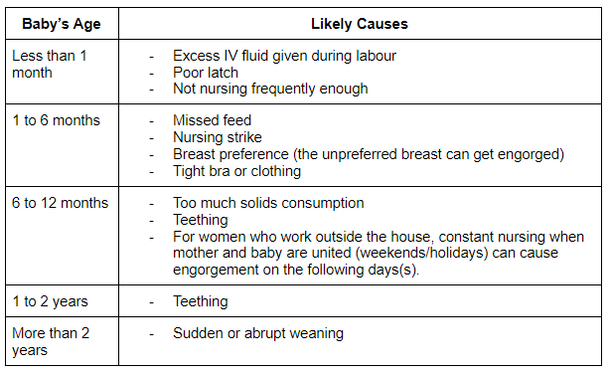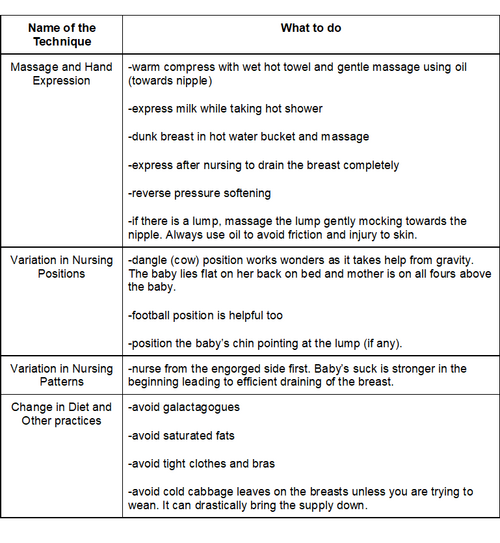Engorgement
One of the common challenges faced by many breastfeeding mothers is engorgement. Engorgement essentially contains the following symptoms.
- Your breasts seem tight, full, and uncomfortable.
- There can be mild to excruciating pain when you touch your breasts.
- The fullness and pain don’t go away upon nursing.
- Breasts are hard and shiny.
Common causes of Engorgement:

- Mild to moderate engorgement

- Severe Engorgement
It can be very painful as breast tissue becomes extremely sensitive during severe engorgement.
If hand expression is too painful and the breast tissue has swollen up a lot, do the following before using the techniques mentioned in the table above –
- Firstly, use a cold compress in order to lessen the inflammation.
- Secondly, follow the cold compress with a gentle massage.
- Lastly, attempt hand expression in a warm/hot shower. That will make it less painful.
For a pumping mother, it helps to keep the following things in mind:
It’s important to always empty the breast. Sometimes pumps can’t drain the breast completely, it’s recommended to hand express to drain the breast completely.
- Pump in dangle position. This helps use gravity to dislodge the clog.
- Pump every 2-3 hours. Use the letdown mode/massage mode of your pump for 12-15 mins while you massage your breasts.
- Use a few drops of coconut oil to massage. Also apply some on the flange if necessary.
- When breasts are making more milk than needed, and you are feeling engorged, pumping to empty may sound like it’s the problem. However, know that when you are going through this, it’s important to first find relief. And relief comes only when you fully and efficiently empty the breast. Over time, slowly, you can teach your body to make less milk. It takes time, and patience.
What happens if engorgement is ignored?
Mastitis usually happens when the mother ignores all the signs for a long time, and has fever and shivers along with pain. In a few cases, mastitis can happen without fever as well. But the redness is very very evident. Usually accompanied with redness of the breast tissue. In case you have done all the above and the fever doesn’t subside, or the size of lump doesn’t change, and other symptoms of engorgement don’t decrease, please consult a doctor or your gynaecologist. Don’t ignore this. Try the above remedies but be vigilant as well.
References :
https://kellymom.com/bf/concerns/mother/engorgement/
https://www.llli.org/breastfeeding-info/engorgement/
Easy Breastfeeding by Camilla Conti
Wish to speak with a member of our team who is a certified lactation professional and also an experienced breastfeeding mother, click on this link.
Medical Advice Disclaimer
THIS WEBSITE DOES NOT PROVIDE MEDICAL ADVICE.
The information, including but not limited to, text, graphics, images and other material contained on this website are for informational purposes only. No material on this site is intended to be a substitute for professional medical advice, diagnosis or treatment. Always seek the advice of your physician or other qualified health care provider with any questions you may have regarding a medical condition or treatment before undertaking a new health care regimen, and never disregard professional medical advice or delay in seeking it because of something you have read on this website.
Disclaimer
We understand and acknowledge that parents and babies can be of various genders on a spectrum of LGBTQI+. Families come in diverse flavours. However, in our articles, for the sake of simplicity and convenience, we will be referring to the breastfeeding parent as the mother and using the female pronouns- ‘she’ and ‘her’ for babies. Babies can be nourished and nurtured in different ways and while we have used the terms breastfeeding and nursing, we recognize that parents can opt to chest feed or finger feed.
We don’t have conflicts of interest and declare, and we are compliant with the WHO code of marketing of breastmilk substitutes and the IMS act.
In case you find any information on this website that needs to be updated, please write to us at info@bsim.org.in






